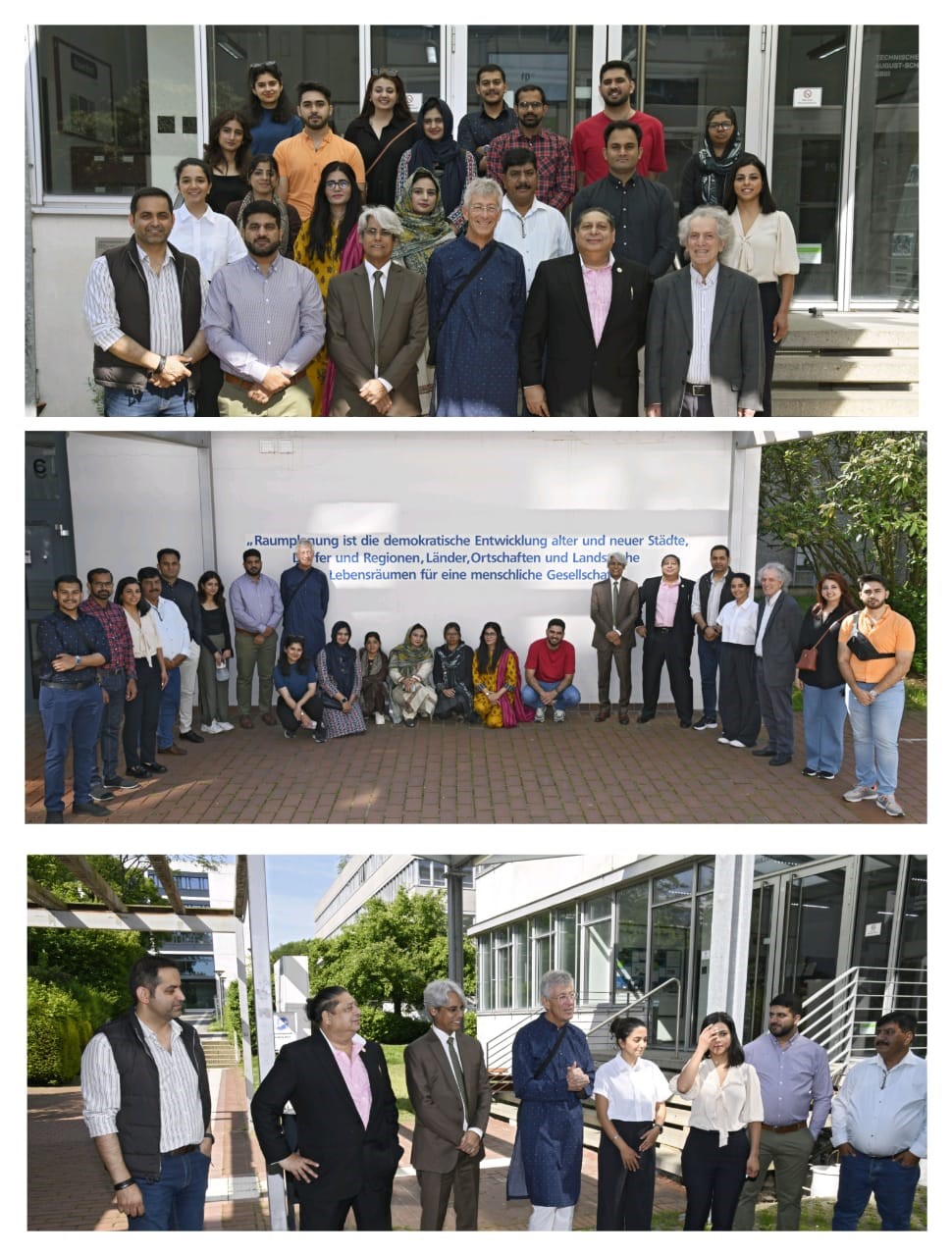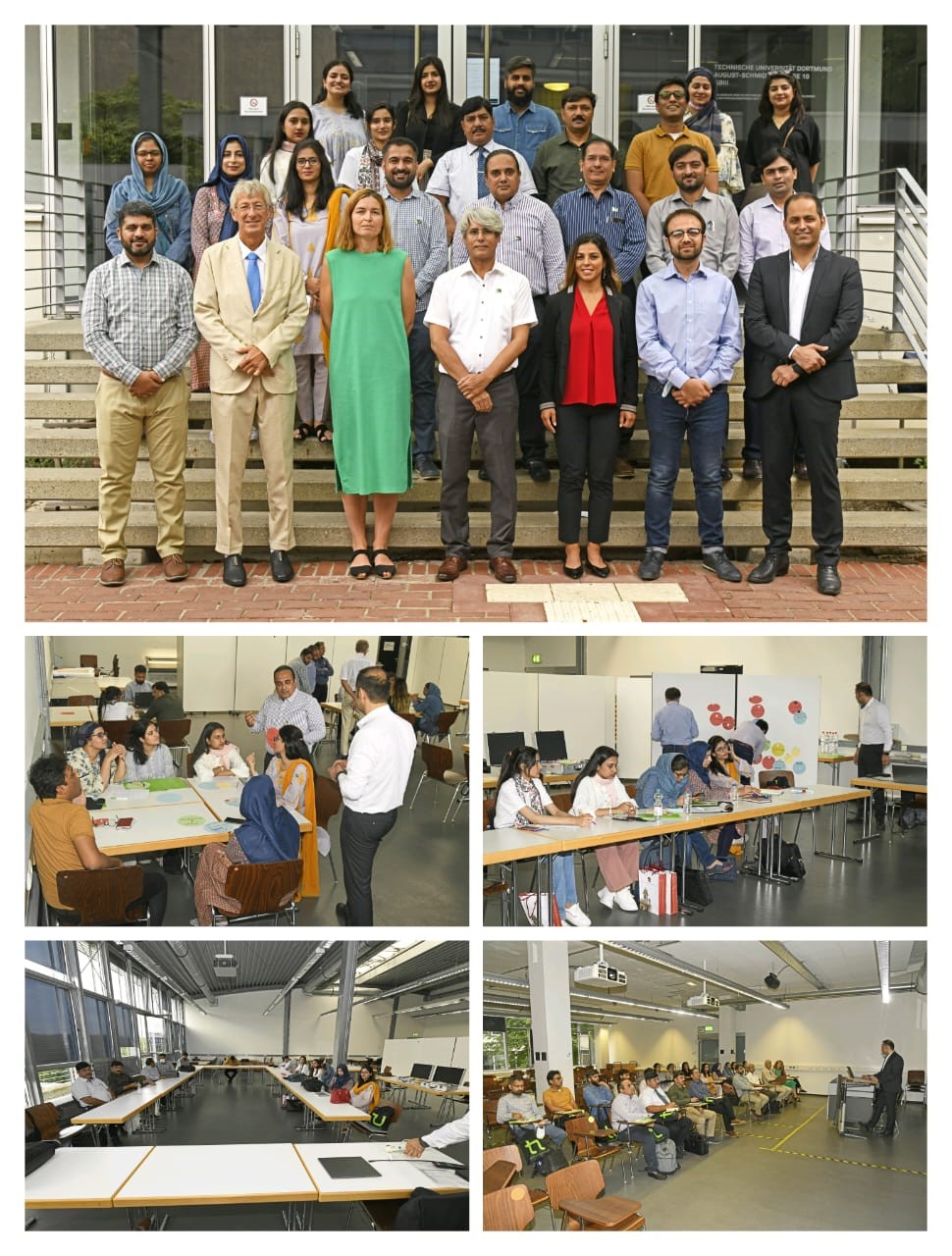Project Title
Planning in Germany and Pakistan: Responding Challenges of Climate Change Through Intercultural Dialogue
FUNDED BY DAAD, GOVERNMENT OF GERMANY
|
Departments Involve |
Team Members |
|
Germany: TU Dortmund University, Department of Spatial Planning, Research Group Landscape Ecology and Landscape Planning. |
Prof. Dr. Dietwald Gruehn (Project Team Leader Germany) Dr. Mohammad Bashirizadeh (Team Member) |
|
Pakistan: 1. Department of City & Regional Planning University of Engineering and Technology, Lahore. |
Prof Dr. Shaker Mahmood (Project Team Leader Pakistan)
|
|
2. Department of City & Regional Planning Lahore College for Women University, Lahore. |
Prof. Dr. M. Atiq Ur Rahman (Focal Person LCWU)
|
|
3. Department of Development Studies National University of Science and Technology, Islamabad. |
Dr Umer Khayyam (Focal Person NUST) |
BRIEF DESCRIPTION
The project titled "Planning in Germany and Pakistan: Responding Challenges of Climate Change through Intercultural Dialogue" seeks to initiate and facilitate dialogue among students and young academics from Germany and higher education institutes in Pakistan. The primary objectives include the modernization of teaching methods, the promotion of skill development among young academics, identification of shared scientific interests in teaching and research, and the establishment of regional and international networks and cooperation. The project, designed for a three-year duration, focuses on organizing workshops, providing training on university didactics, conceptualizing, and conducting seminars, and hosting annual conferences, including reflection meetings and discussions.
The dialogue and exchange activities revolve around two key topics: 'Adaptation to climate change' and 'cross-cultural perception of urban and rural landscapes and cultural heritage.' Rather than limiting the scope, these topics serve as a starting point for dialogue and exchange, fostering mutual understanding and partnership. Building on these experiences, the project aims to develop joint curricula, identify areas for teaching and research cooperation, and extend collaboration regionally and internationally.
Implemented by the Department of Spatial Planning at TU Dortmund University in collaboration with three Pakistani universities—University of Engineering and Technology (UET) Lahore, Lahore College for Women University (LCWU), and National University of Sciences and Technology (NUST) Islamabad—the project highlights two special topics to enhance dialogue, exchange, and the identification of teaching and research prerequisites. In the first year, the focus is on climate change, a topic relevant to both European and Islamic contexts. The aim was to understand future impacts and adjust spatial planning to address environmental changes, fostering dialogue on ecological parameters and spatial planning methods.
The project draws on experiences from Iran, a country in the Islamic world significantly affected by climate change. The study of architectural, social, urban planning, and environmental approaches to climate change challenges in Iran underscores the need for international and interdisciplinary collaboration. Recognizing climate change as a global phenomenon, the project seeks to leverage collaborative efforts with Pakistan to expand the research network on climate issues within the same regional context. The goal is to build on established research and extend the collaborative impact on climate-related issues, emphasizing the necessity for evidence-based solutions beyond national boundaries.
WORKSHOPS HELD IN BOTH COUNTRIES:
Spring Workshop held in Dortmund, Germany Planning in Germany and Pakistan: Cross-cultural perception of urban and rural landscape and cultural heritage from May 11th- 18th, 2024.
Winter School Planning in Germany and Pakistan: Cross-cultural perception of urban and rural landscape and cultural heritage jointly by Lahore College For Women University (LCWU);held in University of Engineering and Technology (UET) from 23rd -30th- November 2024
Winter School “Responding to Challenges of Climate Change through Intercultural Dialogue” Planning in Germany and Pakistan, Jointly organized by Lahore College For Women University (LCWU); University of Engineering and Technology (UET) 22nd -24 November and National University of Science & Technology 29th November -1st December 2023 NUST
Official workshop and international Conference “Responding to Challenges of Climate Change through Intercultural Dialogue” Planning in Germany and Pakistan, organized by University of Engineering and Technology (UET) 17th -23rd December 2022.
Summer School in Dortmund Germany from 12 August- 22 August 2022 on “Responding to Challenges of Climate Change through Intercultural Dialogue” Planning in Germany and Pakistan, organized by Technical University Dortmund Germany; funded Under DAAD
Official workshop and international Conference “Responding to Challenges of Climate Change through Intercultural Dialogue” Planning in Germany and Pakistan, organized by University of Engineering and Technology (UET) 17th -23rd December 2022.
PARTICIPANTS FROM LCWU VISITED GERMANY UNDER THIS PROJECT:
1. Prof. Dr. Muhammad Atiq ur Rahman (Chairperson, CRP-LCWU)
2. Miss Siddiqa Amin
3. Miss Maria Ali (Lecturer CRP)
4. Hafiza Saba Islam (Lecturer CRP)
5. Faryal Khalid (Lecturer CRP)
6. Hania Arif (Lecturer DM)
7. Aqsa Mahmood (final Year Students Session (2018-2022)
8. Qudsia Bano (Final Year Student 2020-2024)
9. Syeda Areej Zahra Naqvi (Final Year Student 2021-2025)
WORKSHOP OUTCOMES
The workshops conducted so far those created a platform where students from all participating universities with diverse background in Germany and Pakistan got engaged in meaningful dialogue, fostering mutual understanding and collaboration. The conducted workshops also open a floor of new vistas of knowledge and increased the awareness of climate change issues, emphasizing the global nature of the problem and the need for coordinated efforts and what research areas need to be focused more.
All the participants have also leaned the skill to deliver engaging presentations and effective research writing skills in planning, beside that communication, and problem-solving, preparing them to contribute to climate change mitigation and adaptation efforts were also discussed with group of experts. Besides that, visits to different cities of Germany to contributed to real life learning and observations of the spatial planning of the cities and get insights on climate change challenges unique to their region.
USABILITY OF THE EXPERIENCE /RESULTS OF THE PROJECT
During the initial phase of network development, TU Dortmund University, along with the Department of City & Regional Planning at UET, the Department of City & Regional Planning at LCWU, and NUST, serve as key collaborators. They bring together pertinent German and Pakistani partners based on expertise and interest. However, the goal for this primary partnership is to evolve into regional alliances focused on institutions, specific topics, planning projects, or research initiatives that hold spatial or institutional relevance. This vision involves the creation of regionally dispersed and decentralized knowledge alliances, fostering centers of excellence capable of engaging with partners not only within the Islamic world but also in Europe. To facilitate the growth of the network, the project team concentrates on building and integrating partnerships beyond the initial framework.
Establishing multiple regional centers of excellence within the Pakistani network will enhance the network's capacity and necessitate the inclusion of new projects and partners to support ongoing research and planning activities. The Project includes a supra-regional outreach, initially targeting Iraq and Iran, as well as ongoing Planning Education projects. Iran, with its significant historical ties to Pakistan, is situated adjacent to the country. This project capitalizes on past and present DAAD investments in Iraq and Iran, leveraging existing curriculum and fostering European, Iraqi, and Iranian professional development within the Planning Education programs. In the medium term, an extension of the current SPRING-network (Spatial Planning in Regions of Growing Economies) at TU Dortmund University appears feasible. Drawing from these experiences, the network will not only facilitate the publication of project results in relevant journals but also enable collaborative applications for future research projects. 





